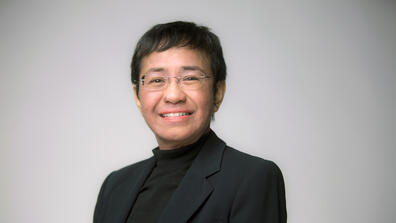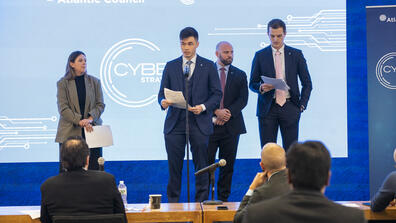Science Fiction Times

In May, Maria Ressa delivered an inspiring, but cautionary, address to SIPA’s Class of 2023.
“This is the worst of who we are, of human nature,” she says, “and social media is doing its best to fan that flame inside you; it is inciting fear, anger, hate, tribalism.”
No one understands the dark side of human nature better than Ressa, a journalist, entrepreneur, and activist whose personal experience highlights the dangerous threat that artificial intelligence technology poses to democratic norms and institutions.
As cofounder of the Philippine online news site Rappler, Ressa worked tirelessly and at great risk to her personal safety to expose the corruption, violence, and authoritarian tactics of former president Rodrigo Duterte’s regime. Ressa’s focus on Duterte’s murderous war on drugs led to a regime- sponsored mis- and disinformation campaign against her and Rappler and her subsequent 2019 arrest under a cybercrime prevention law designed to silence critics of the regime. In 2020, a Manila court found Ressa guilty of “cyber libel” in a politically motivated trial.
Ressa’s arrest and conviction drew the attention of democracy and free speech advocates the world over, including Secretary Hillary Rodham Clinton, who experienced firsthand how rapidly evolving technology like AI deepfakes can impact democratic elections. Clinton helped bring Ressa to SIPA as a Carnegie Distinguished Fellow at the School’s new Institute of Global Politics (IGP), where the 2021 Nobel Peace Prize winner will focus on the intersection of AI, democracy, and human rights.
“She was one of the very first people to recognize the dangers of mis- and disinformation,” Clinton said at SIPA’s Leadership Dinner in May. “It’s not abstract to her. It’s not just people saying goofy and untrue things online, it is using the internet to elect dictators, to run genocidal military missions against minority groups. It is shaping people’s minds. It is undermining democracy.”
Ressa’s work as an IGP Distinguished Fellow will leverage her nearly 40 years in journalism to address what she calls the “treadmill” of using “old paradigms to solve new problems.”
“I have had both the curse and the blessing of being the target of attacks,” she says. “But I’m not just the journalist who’s targeted in these exponential attacks. I run the business. I see the numbers. I also build the tech. So that gave me a unique perspective where I could see the data. And it helped me stand up against a dictator.”
Ressa was born in the Philippines but grew up mainly in New Jersey, where she attended Princeton. She returned to her birth country on a Fulbright and began a storied career in journalism in Asia. After two decades at CNN and heading the news at ABS-CBN, the Philippines’ largest network, Ressa says she realized that the internet and social media are the future. Her investigation of al-Qaeda’s use of social media to spread propaganda— chronicled in her 2013 book From Bin Laden to Facebook — led to the founding of Rappler.
“If the terrorists are using this new technology to grow, to spread this ideology, why couldn’t we use it for good?” she asks rhetorically. For Ressa, the early promise of social media soon turned sour.
“I would say social media was a force for good until around 2013 or 2014,” she says. “Essentially, these [tech] companies will take atomized posts and use machine learning to create a model of each of us on the platforms that they then use AI to pull together into the motherlode database that's used for microtargeting.”
Russia’s information operations used this technology to seed “metanarratives” on social media that helped pave the way for their annexation of Crimea and, ultimately, similar campaigns to influence Brexit, the 2016 US presidential election, and Duterte’s efforts to silence Ressa.
What information operations have done, she says, is show us “that you can literally change history in front of our eyes.”
At the Institute, Ressa is interested in furthering her work at the nexus of “technology, journalism, and community.” She’ll lead several projects related to the role of artificial intelligence in democracy, examining online harassment, coded biases in algorithms, and the effects of AI on human rights across the globe.
“We need to come up with new ideas, new directions, and bring different people to the table to find short- and medium-term responses to what tech has done,” Ressa says. “It isn’t necessarily working with the tech companies, because they have proven them- selves unreliable partners. They’ve brought about great destruction. So, the first part is accountability. The second part is putting in place guardrails that will protect humanity.”
Ressa and fellow Nobel laureate Dmitry Muratov recently introduced the “10 Point Plan to Address Our Information Crisis,” which outlines “urgent actions that rights-respecting governments and the UN should take.” The plan’s signatories include Columbia and SIPA professor Joseph E. Stiglitz, a 2001 Nobel laureate in econom- ics and member of the IGP’s faculty advisory board, who noted that “self-regulation of the internet won’t work any better than self-regulation of banking did.”
In July 2024, Ressa will join the SIPA faculty as a professor of professional practice. She will teach courses related to AI in the public sphere and will push students to move quickly in the face of existential threats.
“We are living in science fiction times, and our fate is in your hands,” Ressa told graduates in May. “I think I shouldn’t say congratulations, I should say welcome to the battlefield.”


